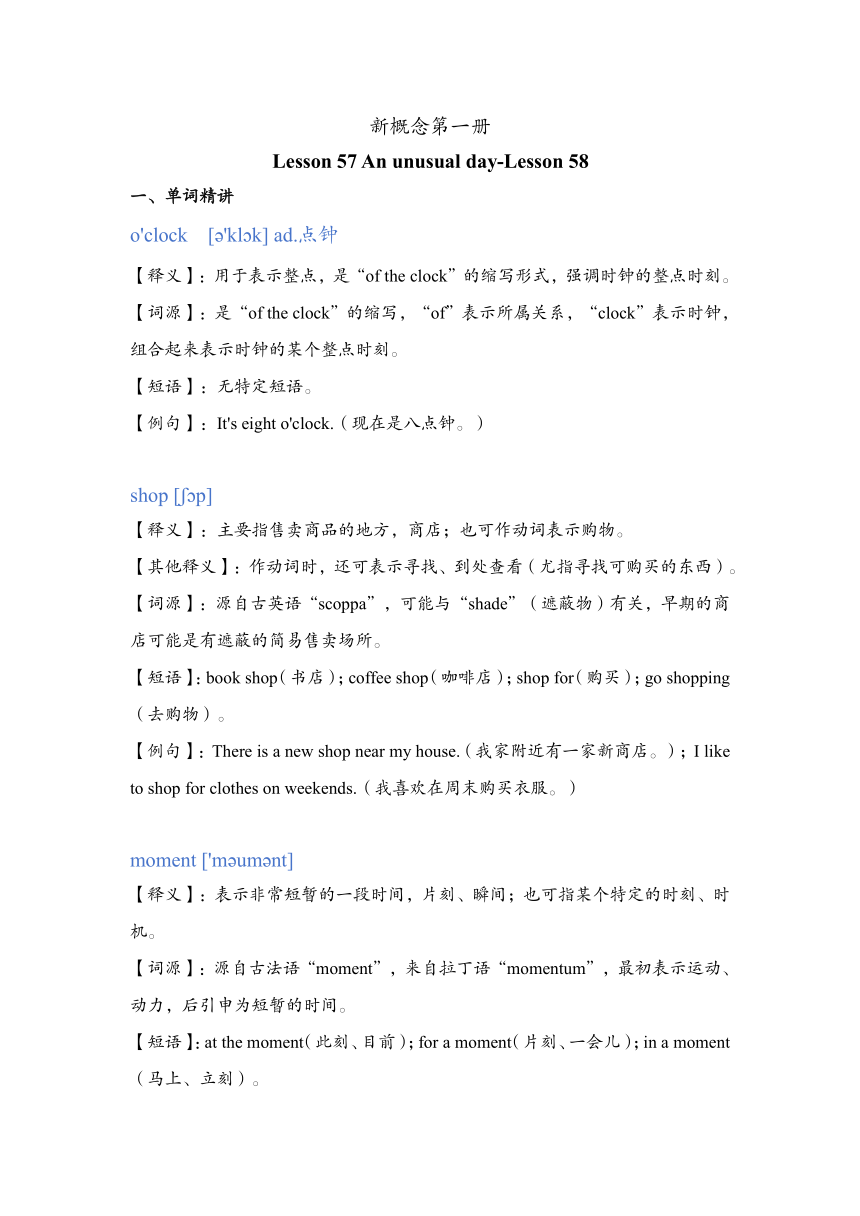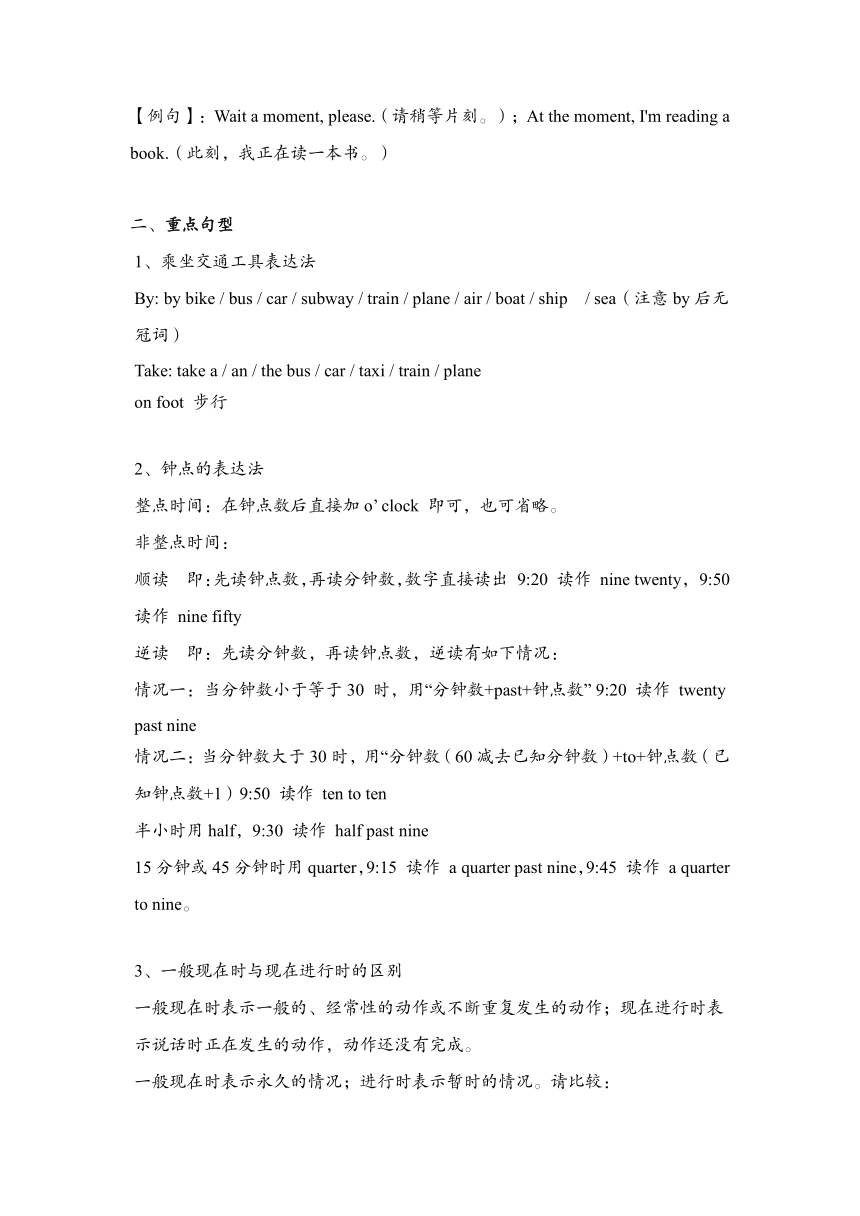新概念第一册Lesson 57 An unusual day-Lesson 58讲义
文档属性
| 名称 | 新概念第一册Lesson 57 An unusual day-Lesson 58讲义 |  | |
| 格式 | docx | ||
| 文件大小 | 88.9KB | ||
| 资源类型 | 教案 | ||
| 版本资源 | 新概念英语 | ||
| 科目 | 英语 | ||
| 更新时间 | 2024-12-03 09:38:53 | ||
图片预览


文档简介
新概念第一册
Lesson 57 An unusual day-Lesson 58
单词精讲
o'clock [ 'kl k] ad.点钟
【释义】:用于表示整点,是“of the clock”的缩写形式,强调时钟的整点时刻。
【词源】:是“of the clock”的缩写,“of”表示所属关系,“clock”表示时钟,组合起来表示时钟的某个整点时刻。
【短语】:无特定短语。
【例句】:It's eight o'clock.(现在是八点钟。)
shop [ p]
【释义】:主要指售卖商品的地方,商店;也可作动词表示购物。
【其他释义】:作动词时,还可表示寻找、到处查看(尤指寻找可购买的东西)。
【词源】:源自古英语“scoppa”,可能与“shade”(遮蔽物)有关,早期的商店可能是有遮蔽的简易售卖场所。
【短语】:book shop(书店);coffee shop(咖啡店);shop for(购买);go shopping(去购物)。
【例句】:There is a new shop near my house.(我家附近有一家新商店。);I like to shop for clothes on weekends.(我喜欢在周末购买衣服。)
moment ['m um nt]
【释义】:表示非常短暂的一段时间,片刻、瞬间;也可指某个特定的时刻、时机。
【词源】:源自古法语“moment”,来自拉丁语“momentum”,最初表示运动、动力,后引申为短暂的时间。
【短语】:at the moment(此刻、目前);for a moment(片刻、一会儿);in a moment(马上、立刻)。
【例句】:Wait a moment, please.(请稍等片刻。);At the moment, I'm reading a book.(此刻,我正在读一本书。)
重点句型
1、乘坐交通工具表达法
By: by bike / bus / car / subway / train / plane / air / boat / ship / sea(注意by后无冠词)
Take: take a / an / the bus / car / taxi / train / plane
on foot 步行
2、钟点的表达法
整点时间:在钟点数后直接加o’ clock 即可,也可省略。
非整点时间:
顺读 即:先读钟点数,再读分钟数,数字直接读出 9:20 读作 nine twenty, 9:50 读作 nine fifty
逆读 即:先读分钟数,再读钟点数,逆读有如下情况:
情况一:当分钟数小于等于30 时,用“分钟数+past+钟点数” 9:20 读作 twenty past nine
情况二:当分钟数大于30时,用“分钟数(60减去已知分钟数)+to+钟点数(已知钟点数+1)9:50 读作 ten to ten
半小时用half,9:30 读作 half past nine
15分钟或45分钟时用quarter,9:15 读作 a quarter past nine,9:45 读作 a quarter to nine。
3、一般现在时与现在进行时的区别
一般现在时表示一般的、经常性的动作或不断重复发生的动作;现在进行时表示说话时正在发生的动作,动作还没有完成。
一般现在时表示永久的情况;进行时表示暂时的情况。请比较:
Jane works very hard most of the time.
简大多工作努力。
Jane is working hard today.
简今天工作很努力。
进行时只用于表示动作或偶尔发生的事件(We are eating, it is raining等等)。有些动词(如 like, want, know 等)不是动作动词,因此不能用进行时态,如不能说 I am knowing 或We are liking,而只能说 I know或 We like。
一般现在时表达某个习惯性动作,通常与时间频度副词连用,如usually, always, often, sometimes, never 等;现在进行时表示此时此刻正在进行的动作,一般与 now, at the moment, today, this afternoon, this evening,tonight 等连用。
三、课文精讲
1.It is eight o'clock.
it是非人称代词。
2.The children go to school by car every day, but today, they are going to school on foot.
go to school 上学
be going to...将要去某地
on foot 步行
by car, 乘汽车。
by(乘坐)表示"乘坐(某种交通工具)",但它必须与动词连用。表交通工具的名词前不加冠词:
by boat 乘船
by bus 乘公共汽车
by plane 乘飞机
by sea 乘船
3.Mrs. Sawyer usually stays at home in the morning
stay at home 呆在家里
4.Mrs. Sawyer usually drinks tea in the living-room.
drink tea 喝茶
living room 客厅
5.In the evening, the children usually do their homework.
do homework 做作业
6.At the moment, they are playing in the garden.
at the moment 现在
Lesson 57 An unusual day-Lesson 58
单词精讲
o'clock [ 'kl k] ad.点钟
【释义】:用于表示整点,是“of the clock”的缩写形式,强调时钟的整点时刻。
【词源】:是“of the clock”的缩写,“of”表示所属关系,“clock”表示时钟,组合起来表示时钟的某个整点时刻。
【短语】:无特定短语。
【例句】:It's eight o'clock.(现在是八点钟。)
shop [ p]
【释义】:主要指售卖商品的地方,商店;也可作动词表示购物。
【其他释义】:作动词时,还可表示寻找、到处查看(尤指寻找可购买的东西)。
【词源】:源自古英语“scoppa”,可能与“shade”(遮蔽物)有关,早期的商店可能是有遮蔽的简易售卖场所。
【短语】:book shop(书店);coffee shop(咖啡店);shop for(购买);go shopping(去购物)。
【例句】:There is a new shop near my house.(我家附近有一家新商店。);I like to shop for clothes on weekends.(我喜欢在周末购买衣服。)
moment ['m um nt]
【释义】:表示非常短暂的一段时间,片刻、瞬间;也可指某个特定的时刻、时机。
【词源】:源自古法语“moment”,来自拉丁语“momentum”,最初表示运动、动力,后引申为短暂的时间。
【短语】:at the moment(此刻、目前);for a moment(片刻、一会儿);in a moment(马上、立刻)。
【例句】:Wait a moment, please.(请稍等片刻。);At the moment, I'm reading a book.(此刻,我正在读一本书。)
重点句型
1、乘坐交通工具表达法
By: by bike / bus / car / subway / train / plane / air / boat / ship / sea(注意by后无冠词)
Take: take a / an / the bus / car / taxi / train / plane
on foot 步行
2、钟点的表达法
整点时间:在钟点数后直接加o’ clock 即可,也可省略。
非整点时间:
顺读 即:先读钟点数,再读分钟数,数字直接读出 9:20 读作 nine twenty, 9:50 读作 nine fifty
逆读 即:先读分钟数,再读钟点数,逆读有如下情况:
情况一:当分钟数小于等于30 时,用“分钟数+past+钟点数” 9:20 读作 twenty past nine
情况二:当分钟数大于30时,用“分钟数(60减去已知分钟数)+to+钟点数(已知钟点数+1)9:50 读作 ten to ten
半小时用half,9:30 读作 half past nine
15分钟或45分钟时用quarter,9:15 读作 a quarter past nine,9:45 读作 a quarter to nine。
3、一般现在时与现在进行时的区别
一般现在时表示一般的、经常性的动作或不断重复发生的动作;现在进行时表示说话时正在发生的动作,动作还没有完成。
一般现在时表示永久的情况;进行时表示暂时的情况。请比较:
Jane works very hard most of the time.
简大多工作努力。
Jane is working hard today.
简今天工作很努力。
进行时只用于表示动作或偶尔发生的事件(We are eating, it is raining等等)。有些动词(如 like, want, know 等)不是动作动词,因此不能用进行时态,如不能说 I am knowing 或We are liking,而只能说 I know或 We like。
一般现在时表达某个习惯性动作,通常与时间频度副词连用,如usually, always, often, sometimes, never 等;现在进行时表示此时此刻正在进行的动作,一般与 now, at the moment, today, this afternoon, this evening,tonight 等连用。
三、课文精讲
1.It is eight o'clock.
it是非人称代词。
2.The children go to school by car every day, but today, they are going to school on foot.
go to school 上学
be going to...将要去某地
on foot 步行
by car, 乘汽车。
by(乘坐)表示"乘坐(某种交通工具)",但它必须与动词连用。表交通工具的名词前不加冠词:
by boat 乘船
by bus 乘公共汽车
by plane 乘飞机
by sea 乘船
3.Mrs. Sawyer usually stays at home in the morning
stay at home 呆在家里
4.Mrs. Sawyer usually drinks tea in the living-room.
drink tea 喝茶
living room 客厅
5.In the evening, the children usually do their homework.
do homework 做作业
6.At the moment, they are playing in the garden.
at the moment 现在
同课章节目录
